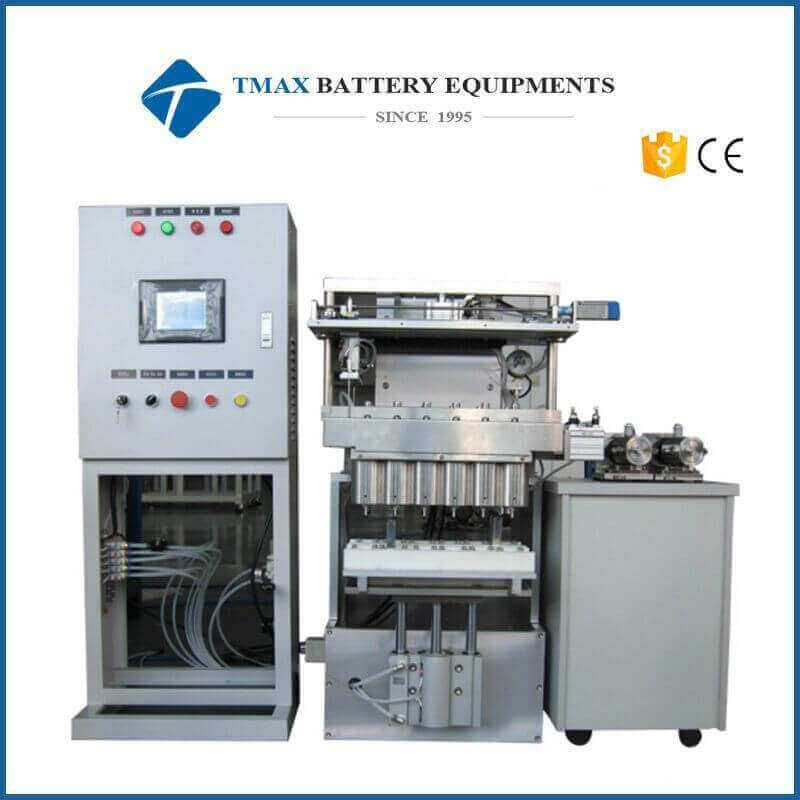- E-Mail : David@tmaxcn.com
- E-Mail : Davidtmaxcn@gmail.com
- : No. 39, Xinchang Road, Xinyang, Haicang Dist., Xiamen, Fujian, China (Mainland)
Lithium-Batterie-Labormaschine
Prismatic cell pilot plant
August 8,2023.
Prismatic cell pilot plants play a crucial role in the research, development, and optimization of prismatic lithium-ion batteries. These specialized facilities are designed to replicate and evaluate the manufacturing processes of prismatic cells on a pilot scale before full-scale commercial production. The primary functions and significance of prismatic cell pilot plants include:
Process Development and Optimization:
Prismatic cell pilot plants allow researchers and engineers to experiment with various manufacturing processes, materials, and parameters to optimize the production of prismatic cells. This includes electrode preparation, cell assembly, electrolyte filling machine, and prismatic cell sealing. By testing different approaches, they can identify the most efficient and cost-effective methods for large-scale production.
Scale-Up Validation:
Before transitioning to commercial production, it's essential to validate that the processes developed in the laboratory can be successfully scaled up. Prismatic cell pilot plants provide a controlled environment to test the scalability of various manufacturing steps, ensuring that the quality and performance of prismatic cells are maintained at larger production volumes.
Performance and Quality Testing:
Prismatic cell pilot plants allow for comprehensive testing and characterization of the prismatic cells produced. This includes evaluating the cells' electrical performance, capacity, energy density, cycle life, safety features, and thermal behavior. This data helps identify any issues or improvements needed before full-scale production begins.
Materials Selection and Characterization:
Researchers can use prismatic cell pilot plants to assess different materials, including electrode materials, electrolytes, separators, and current collectors. This enables them to understand how different materials affect the overall performance and longevity of prismatic cells.
Safety Evaluation:
Prismatic cell pilot plants provide a controlled environment to assess the safety features of the prismatic cells, including thermal runaway behaviors and potential hazards. This is crucial for ensuring the cells meet stringent safety standards, especially in applications where safety is of utmost importance, such as electric vehicles.
Prototyping and Customization:
Prismatic cell pilot plants allow for the production of small batches of prismatic cells that can be customized for specific applications or research purposes. This enables researchers to explore novel designs, electrode configurations, or chemistries.
Knowledge Generation and Training:
Prismatic cell pilot plants generate valuable knowledge about the production processes and behavior of prismatic cells. This knowledge can be shared within the organization, facilitating training of production personnel and helping develop standardized procedures for full-scale manufacturing.
Cost Analysis and Feasibility Studies:
By producing prismatic cells on a pilot scale, researchers and engineers can gather data to conduct cost analyses and feasibility studies. This helps estimate the production costs, potential economies of scale, and market viability of prismatic cells.
Process Development and Optimization:
Prismatic cell pilot plants allow researchers and engineers to experiment with various manufacturing processes, materials, and parameters to optimize the production of prismatic cells. This includes electrode preparation, cell assembly, electrolyte filling machine, and prismatic cell sealing. By testing different approaches, they can identify the most efficient and cost-effective methods for large-scale production.
Scale-Up Validation:
Before transitioning to commercial production, it's essential to validate that the processes developed in the laboratory can be successfully scaled up. Prismatic cell pilot plants provide a controlled environment to test the scalability of various manufacturing steps, ensuring that the quality and performance of prismatic cells are maintained at larger production volumes.
Performance and Quality Testing:
Prismatic cell pilot plants allow for comprehensive testing and characterization of the prismatic cells produced. This includes evaluating the cells' electrical performance, capacity, energy density, cycle life, safety features, and thermal behavior. This data helps identify any issues or improvements needed before full-scale production begins.
Materials Selection and Characterization:
Researchers can use prismatic cell pilot plants to assess different materials, including electrode materials, electrolytes, separators, and current collectors. This enables them to understand how different materials affect the overall performance and longevity of prismatic cells.
Safety Evaluation:
Prismatic cell pilot plants provide a controlled environment to assess the safety features of the prismatic cells, including thermal runaway behaviors and potential hazards. This is crucial for ensuring the cells meet stringent safety standards, especially in applications where safety is of utmost importance, such as electric vehicles.
Prototyping and Customization:
Prismatic cell pilot plants allow for the production of small batches of prismatic cells that can be customized for specific applications or research purposes. This enables researchers to explore novel designs, electrode configurations, or chemistries.
Knowledge Generation and Training:
Prismatic cell pilot plants generate valuable knowledge about the production processes and behavior of prismatic cells. This knowledge can be shared within the organization, facilitating training of production personnel and helping develop standardized procedures for full-scale manufacturing.
Cost Analysis and Feasibility Studies:
By producing prismatic cells on a pilot scale, researchers and engineers can gather data to conduct cost analyses and feasibility studies. This helps estimate the production costs, potential economies of scale, and market viability of prismatic cells.
In summary, prismatic cell pilot plants serve as critical intermediaries between laboratory-scale research and large-scale commercial production. They allow for process optimization, performance testing, materials assessment, and safety evaluation, ultimately contributing to the advancement of prismatic cell technology and its successful integration into various applications.
 ru
ru English
English











 +86 13174506016
+86 13174506016 David@tmaxcn.com
David@tmaxcn.com

